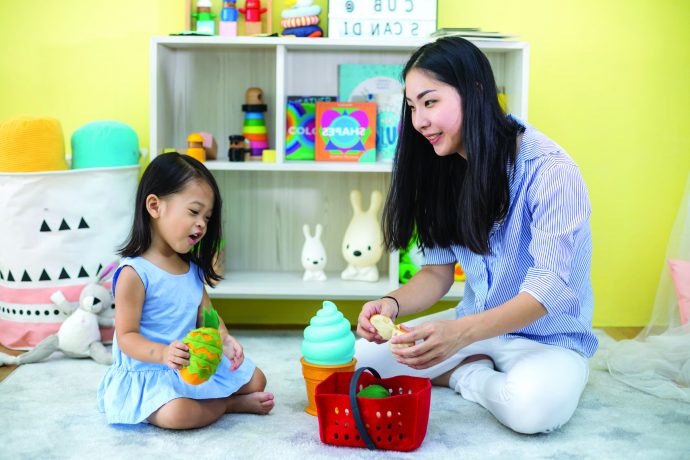Play is a crucial aspect of child development. Playing with dolls is a great example of this as it is a great way to teach your daughter or son about the intricacies of social skills such as empathy and sharing.
Since the dawn of time, children have been playing with toys of various shapes and sizes – dolls, stuffed animals, robots, or dinosaurs – and they are not type-specific for boys or girls. Toys are a fun way of teaching children social norms in society, while pretend play can also encourage their imagination and creativity.
Pretend play, real benefits
There are a number of positive traits associated with pretend or role play using toys, namely:
- Develops emotional skills. Children create their own scenarios or mimic the adults around them and this helps them build important social skills such as empathy. Children can also learn how to express their emotions via role-playing e.g. caring for a “baby” doll, or playing with animal soft toys and feeding/bathing them, etc.
- Stimulates social skills. Pretend play encourages positive traits such as waiting, taking turns, sharing, empathy, caring, etc. It also encourages social interaction with peers, which can be accomplished via role-playing with toys or during imaginary play.
- Encourages closer parent-child bond. Your children may invite you to their tea party with their toy friends, or become a Captain who “sends” you to space. Playing together facilitates closer interaction and deepens the parent-child bond.
- Increases creativity/imagination. Play encourages children to be imaginative and creative, e.g. by creating or emulating “characters” and quite often not-your-daily logic or silly-yet-fun scenarios.
- Allow your children the freedom and flexibility to play as they wish as long as there are no dangers posed to them or others.
Children should also have the freedom to play with a variety of toys. As parents, avoid promoting gender stereotypes on toys as this can lead to gender-differentiated behaviour when they become adults. There is no harm in allowing boys to play with dolls or masak-masak, or letting your daughters play with toy cars and superhero figurines.
While solo playtime has its merits, the adage “the more the merrier” also holds true. Try to arrange playdates with cousins or family friends. You should also make time to play with your children too. That’s because learning how to socialise is important, and when playing with others, encourage them to be helpful, kind and to share.
As your children grow older, they will start wanting their own space and time. Make allowances for this as it will help build their independence. At the same time, continue to encourage them to mix with their peers, but do keep tabs on their activity.
Select appropriate toys
Nowadays, we are spoiled for choice. Before you go on a shopping spree, be aware that most toys have a “shelf-life” as children tend to move on once they outgrow it. Buy toys that are age-appropriate and stimulating, but don’t neglect safety. Some toys may have easily-detachable parts (e.g. buttons, eye pieces, toy accessories, etc.), which are a choking hazard for babies and young children.
You should approach toys with a creative mind set. A “good” toy should encourage your children to use their imagination. Toys need not be expensive! You can even make your own out of recycled items, paper cut-outs, old clothing, socks or even bits of yarn which can be turned into dolls/soft toys.
Nurture them
While toys and creative play are great ways to teach positive concepts and traits to children, parents should make an effort to bond with their children too. Think of the toy as a tool to help you stimulate growth and development, rather than something to keep them entertained while you attend to other business.
Avoid relying 100% on toys alone to stimulate a child’s imagination as this will not have the same result as playing together with them and guiding or teaching them the right concepts to develop their skills.
Most importantly, pay full attention to and listen to your children without becoming distracted by digital gadgets or other things. Practise being fully present with them. It is when parents spend quality time with their children by playing, interacting and connecting with them, that children grow up caring, creative and confident.




Comments